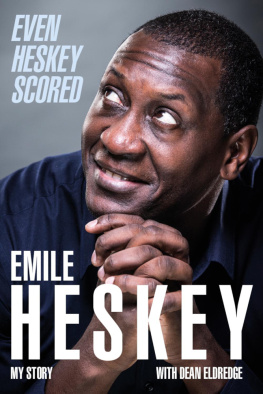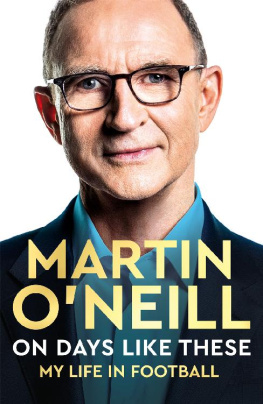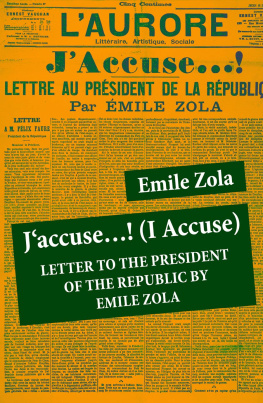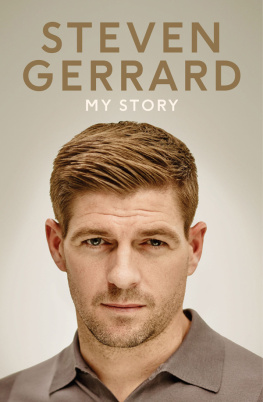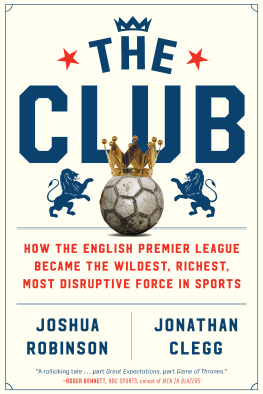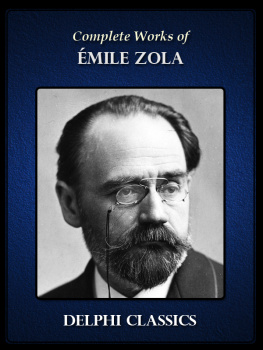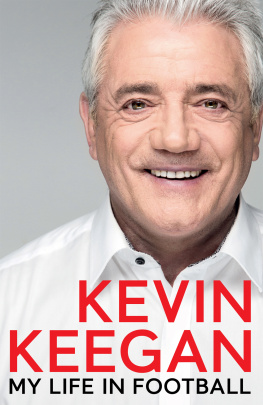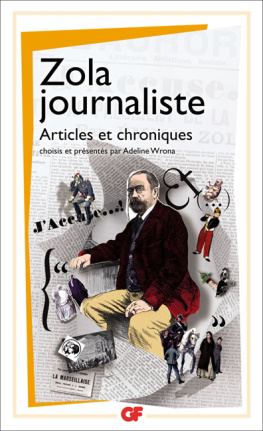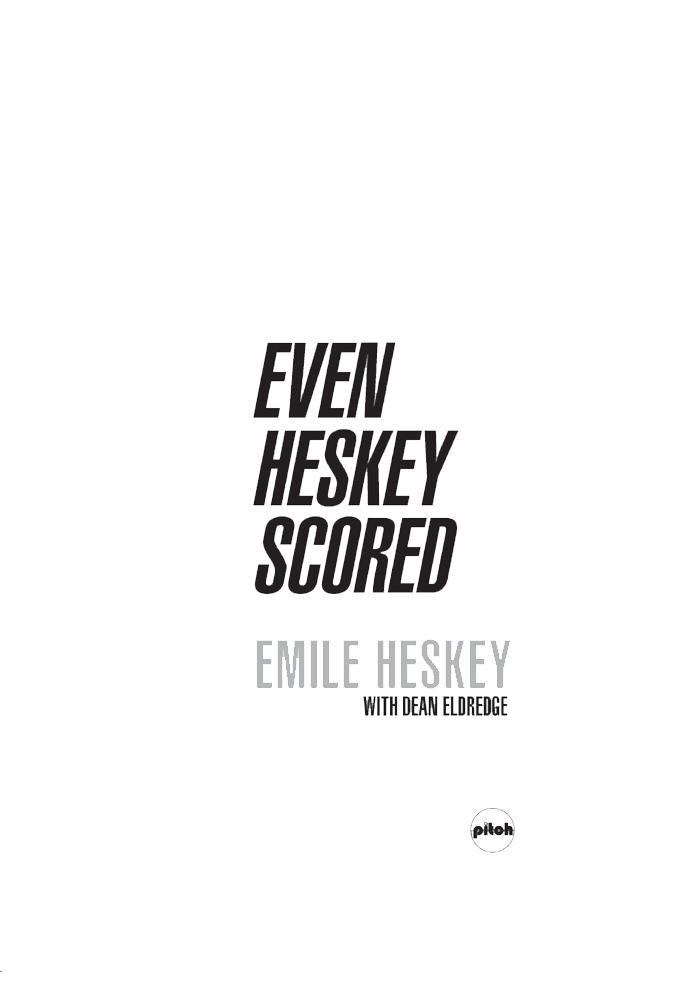First published by Pitch Publishing, 2019
Pitch Publishing
A2 Yeoman Gate
Yeoman Way
Durrington
BN13 3QZ
www.pitchpublishing.co.uk
Emile Heskey and Dean Eldredge, 2019
All rights reserved under International and Pan-American Copyright Conventions. By payment of the required fees, you have been granted the non-exclusive, non-transferable right to access and read the text of this e-book on-screen. No part of this text may be reproduced, transmitted, downloaded, decompiled, reverse-engineered, or stored in or introduced into any information storage and retrieval system, in any form or by any means, whether electronic or mechanical, now known or hereinafter invented, without the express written permission of the Publisher.
A CIP catalogue record is available for this book from the British Library
Print ISBN 978-1-78531-500-8
eBook ISBN 978-1-78531-612-8
--
Ebook Conversion by www.eBookPartnership.com
Contents
This book is for my family. For the generations before me who fought hard to create a better life for us and for my present family who inspire me every day to always give my best. I love you all.
Foreword
by Martin ONeill
F EBRUARY 1996. The rain poured from the darkened skies for most of the afternoon, so by evening kick-off time, Molineux, anticipating the arrival of opponents Leicester City, was well and truly drenched. Mark McGhee, the Wolves manager, had recently departed Filbert Street amidst antipathy and acrimony within the ranks of the Foxes who had watched a number of managers leave in recent seasons just when the club had looked set fair for better times. They were on the warpath, the portents were ominous. McGhee was going to get some verbals that night for his hasty departure. I, as the newly installed Leicester City manager, had an immediate task. Dont get beaten by Wolves. And so Molineux, on that rain-sodden evening, was an intimidating place to be.
I needed a big reaction from the team. Up stepped an 18-year-old, with the strength of a titan and the pace of an Olympic sprinter to conjure an incredible performance that he would reproduce for the club many times over the next four seasons. Emile Heskey was that player. His two brilliantly taken goals not only won the match but made the footballing public take notice.
Twelve weeks later there were rapturous scenes at Wembley Stadium when victory secured promotion to the big league and the young and extremely talented Emile Heskey was on an inexorable path to stardom.
He became a man that evening in Wolverhampton. His strength and pace from the left wing, his tireless appetite for doing the hard yards, plus an understanding of the defensive side of the game for one so very young, made him an automatic choice in the team. But actually he was a centre-forward in the making, as he politely told me just after our play-off triumph, and indeed, centre-forward was where he played for the rest of his career. In our first Premiership home game, on a balmy August evening in 1996, he overwhelmed Southampton with a two-goal salvo to introduce himself to the elite, a place where he truly belonged.
Quiet and well mannered in the dressing room, he was a colossus for us on the playing field. The esteem in which he was held by his team-mates never wavered, because even if Heskey was having a bad day at the office they felt that he was still capable of making something happen that would alter the course of the game. To say that we were an infinitely better team with Emile in the starting line-up would be a rather sizeable understatement.
With the clubs growing success (four top-ten Premiership finishes and two League Cup victories, putting us into Europe twice) Emiles profile was burgeoning. And so it was with much pride but a great deal of sadness that I watched him walk out the Belvoir Drive training ground door and head off to Anfield, the home of Liverpool for a club record fee in 2000. The loss of Heskey was really tough to take, both for myself and the players. It left a void that proved extremely difficult to fill and the team, of which he was such an integral part, would soon break up, to take its place in the history of the club.
I am not well enough informed to talk about his Liverpool days, which were pretty damned good. Our paths did cross briefly in March 2003 when Celtic, the club I was managing at the time, played Liverpool in the quarter-final of the UEFA Cup. Heskeys equalising goal at Parkhead on an incredibly atmospheric evening was continuous proof of his standing in the game. Yet from a distance I thought despite an illustrious career at Anfield, more goals were certainly within Emiles scope. For some reason he wanted to become the provider of chances, rather than the goalscorer supreme. Granted, Michael Owen was the hero in those days and Emiles contribution was immeasurably valuable, but perhaps the shy, somewhat introverted part of his character had too big a grip on him then. Just my view. Emile, with some relish, will totally disagree anyway.
When I re-signed Emile from Wigan Athletic to Aston Villa some years later, he was a different character. A more self-confident individual, naturally, I assumed, as a consequence of medals won, goals scored and international caps gained. He was as physically strong as before but it was my belief that he had decided, long before his body had told him, that he could no longer do the hard yards. Maybe that was the reason for a blazing row with him at half-time at Selhurst Park in a tough FA Cup tie against Crystal Palace.
I felt that he should have got to the ball more quickly than he was doing, held it up better in proper centre-forward fashion, and certainly should have been in the penalty box anticipating the cross more urgently in the first half. He evidently didnt agree, and rose to his feet to tell me so with much more eagerness than he had shown in the previous 45 minutes. We agreed to disagree on this occasion. That said, my belief in Emiles ability never wavered, either at Leicester City when he was so young, or at Villa Park in the latter stages of his outstanding career.
Emile Heskey fulfilled his boyhood ambitions by becoming a top-class player at the very highest level; he has a footballing CV of great distinction. I now have the privilege of writing these words as a foreword to his autobiography and of all the memorable experiences we shared I still hark back to that rainy night in Wolverhampton where this precocious teenager lit up Molineux and, in truth, never looked back.
CHAPTER ONE
Five-One, Even Heskey Scored
I SAW Paul Scholes bursting through. I just thought, Im off. I knew I needed to run; to get towards the goal. He played me through. For a moment, the world seemed to stop. I just needed to get a good touch, to get the ball out of my feet and Id be in on goal. If Im honest, I didnt actually get the best of first touches. It was good enough, not perfect, but it didnt take me out of my stride.
If you can get your shot away early, it can be difficult for goalkeepers to get down to the ball. My mind was focused on striking the ball hard and low. The defender, Marko Rehmer, was closing in on me, and the goalkeeper, Oliver Kahn, was advancing. There was no space to go around him.
Keep it down, dont blaze it over. Hard, true, hit the net. Id done it time after time in training, in games, but never on a night like this. And then it hit me 5-1 Id just scored in the Olympic Stadium in Munich to put England 5-1 up against Germany. FIVE-ONE. This doesnt happen. To put it into context, Germany had only lost one qualification game in their last 60 and hadnt lost at the Olympic Stadium since 1973.

